How to Get Your Documents Authenticated in the Philippines thru Apostille with DFA
To know that the documents originating from your country are authentic, they have an Apostille. Before, you need to have a “red ribbon” to prove it’s legit. Now, most countries accept an Apostille, including the Philippines. Here’s a guide on how to get your Documents Authenticated in the Philippines thru Apostille with DFA.
Last May 14, 2019, the Philippines became part of the Apostille Convention. There's no more "red ribbon," which has a red ribbon and a gold sticker affixed on your document but instead an Apostille with a QR code and gold round sticker. Apostilization is usually done by the Department of Foreign Affairs of the country. Read here more about it.
Apostille compared to Authentication (Red Ribbon)
Here’s a graphic from the Department of Foreign Affairs, Republic of the Philippines Facebook Page comparing the two. You will see that having an Apostille is much faster as you skip one step; going to the Foreign Embassy or Consulate for Legalization. After getting it from the appropriate government agency or legal entity, then you can pass the document to DFA and receive it for your use.
Countries and Territories where an Apostille is accepted
Infographic from Department of Foreign Affairs, Republic of the Philippines Facebook Page
As per the Apostille Convention Website, the following above are the countries that accept the Philippines' Apostille. That means they acknowledge your documents are authentic due to the Apostille included.
However, the country requiring your document is not on the list, then you might need to have it legalized in their foreign embassy or consulate. You'll use 4 steps instead of three. The following countries are also members of the Apostille Convention, but the Philippine Apostille is not yet accepted. So follow the four steps for legalization.
Austria
Finland
Germany
Greece
By Four Steps, this means –
From the Government Agency
To the DFA for Authentication
To the Foreign Embassy or Consulate for Legalization
Received by You – for your use
Philippine Documents you can get Apostille
The documents are as stated by the Authentication Form:
1. NBI Clearance/Sundry
Issued by National Bureau of Investigation
Original document with dry seal (Personal copy is not valid)
2. Birth, Marriage or Death Certificate, Certificate of No Marriage Record (CENOMAR, Advisory on Marriage and/or Negative Records)
Issued by Philippine Statistics Authority or National Statistics Office (or if it’s new, then, from Local Civil Registrar but certified by PSA)
Original document
If entries are unclear, provide an LCR copy of the certificate (Form 1A, 2A, 3A)
3. School Documents
a. For Elementary and High School Level
Form-137 and Diploma
Certified True Copies from the school
Certification, Authentication, and Verification (CAV) from DepEd Regional Office
b. For Technical and Vocational Courses
TOR and Diploma or National Certificate
Certified True Copies from the school
CAV from TESDA
c. For State Colleges and Universities
TOR and Diploma
CAV from the school
d. For Private/Local Colleges and Universities
TOR and Diploma
Certified True Copies from the school
CAV from CHED
4. Professional Regulations Commission (PRC) document/s
Certified True Copies from PRC
5. Medical Certificate/s
For employment: DOH stamp per document
For other purposes: Certification issued by DOH with attached Medical Certificate
6. Civil Aviation Authority (CAAP) issued document/s
Certified by CAAP
7. Driver's License
Certification from Land Transportation Office (LTO Main Branch only)
8. Certificate of Employment/Invitation Letter/Training/ Seminars/ Baptismal Certificates and any other documents issued by a private entity
Notarized Affidavit stating necessary factual circumstances and indicating certificate/s as attachment/s
Certificate of Authority for a Notarial Act (CANA) signed by the Executive Judge/Vice-Executive Judge/any office authorized signatories (issued by the Regional Trial Court)
9. Special Power of Attorney/Memorandum of Agreement/ Memorandum of Understanding/Any other form of Contract/ Affidavit of Consent or Advice/Joint Affidavit/Other Affidavits
Certificate of Authority for a Notarial Act (CANA) signed by the Executive Judge/Vice-Executive Judge/any office authorized signatories (issued by the Regional Trial Court)
10. Court Document/s (Decision, Resolution/Order)
Certified True Copies from the Court
11. Immigration Record/s
Certified by the Bureau of Immigration (BI)
12. DSWD Clearance
Issued by Department of Social Welfare and Development
Original document
13. Police Clearance/Sundry
Issued by Philippine National Police (PNP)
Original document
14. Business Registration and Other Documents issued by a Government Agency (e.g., SEC, DTI, BIR, SSS, Municipal Business Permit & Licensing Office, etc.)
Certified true copy from the issuing office
15. Barangay Clearance/Certificate
Mayor's certification/clearance, which has jurisdiction over the Barangay
16. Export Document/s
Certified by Philippine Chamber of Commerce (PCCI), Department of Health (DOH), Department of Agriculture (DA), or by the Bureau of Food and Drugs (BFAD), depending on the nature of the document
Requirements in getting an Apostille for your Philippine Documents
The document you need to get Apostilled
Authentication Form – you can print this ahead or get it at the DFA Office
Original and Photocopy of your ID – the person contacting the DFA
Digitized Government Issued ID – with signature
The Following IDs are also accepted
Passport
Senior Citizen ID
Solo Parent ID
PWD ID
Voter’s ID or Voter’s Certification
Alumni or Student IDs
Seaman’s Book
Additional Requirements if you have an Authorized Representative or has someone else going to the DFA
Authorization Letter
Photocopy of Applicant’s ID (the one who owns the documents and made the Authorization Letter)
Original SPA from Parents in case the applicant is a Minor
Apostille Fee
PHP 100 per document for Regular (3 working days)
PHP 200 per document for Expedite (1 working day)
Offices where you can get an Apostille or Authenticate your documents
As per DFA Website
DFA Main Consular Office
Authentication Division, OCA ASEANA, ASEANA Business Park
Pres. Diosdado Macapagal Blvd. cor. Bradco Ave., Brgy. Tambo, Paranaque City
oca.authentication@dfa.gov.ph
DFA NCR Northeast
Level 2 Ali Mall Araneta Center, Cubao, Quezon City
ncrnortheast.so@dfa.gov.ph
DFA NCR East
7th Floor SM Megamall Building C, EDSA cor. Julia Vargas Avenue Mandaluyong City
ncreast.so@dfa.gov.ph
DFA NCR South
4th Floor Metro Alabang Town Center, Alabang Zapote Road, Muntinlupa City
dfancrsouth@gmail.com
DFA NCR West
5th Floor, SM City Manila, Conception St., Manila
ncrwest.so@dfa.gov.ph
DFA Cebu
4th Floor Pacific Mall-Metro Mandaue, UN Ave. cor. MC Briones St., Brgy. Estancia, Mandaue City
cebu.rco@dfa.gov.ph / rco-cebu@oca.dfa.gov.ph / dfacebu@yahoo.com
DFA Davao
3rd Floor SM City Davao, Quimpo Boulevard, Ecoland Subdivision, Brgy. Matina, Davao City
davao.rco@dfa.gov.ph
DFA Pampanga
2nd Floor Robinsons StarMills, San Fernando City, Pampanga
pampanga.rco@dfa.gov.ph / rcopampanga@yahoo.com
Steps on How to get an Apostille for Philippine Documents (Walk-in)
STEP 1: Prepare all your requirements. You may need to get an original or certified true copy of your document at the correct government agency or institution.
Don't use fixers or have your documents tampered with. If they are determined by the DFA Officer, you might get prosecuted.
STEP 2: Ask for a number for your queue. As this is a government office, please dress appropriately; no shorts, sleeveless, or slippers.
STEP 3: Fill out an Authentication Form in case you don’t have one yet.
STEP 4: Once your number is called, you will present your ID and the documents you want to verify. If you are a representative, an Authorization letter and the applicant's ID may be presented.
STEP 5: Pay at the Cashier. You will be asked to come back once it is ready.
STEP 6: On the date of release, bring your Original ID and Official Receipt to claim your documents. You will need to drop it at dropbox and wait for the applicant's name to be called.
STEP 7: Present your ID at the releasing window and receive the document with an Apostille. Check it before leaving.
In case you haven't claimed it yet, the documents will be kept for 3 months. After 3 months, it will get disposed of, and you might do the process again.
How to get an Apostille for Philippine Documents (during the Pandemic – by Appointment)
E-mail the DFA Office where you want to visit.
The following details are asked:
Subject: Apostille Appointment
Name:
Preferred Schedule:
List of Documents:
Next: Follow STEPS 1 to 7 above. You might also be asked to print out a confirmation e-mail from the DFA office you have an appointment with.
How to get an Apostille for Philippine Documents (during the Pandemic – by Courier)
If you don't want to go to the DFA Office, you can coordinate with a courier to authenticate your documents.
What’s inside an Apostille Document
Apostille Sample from DFA Brunei
Alternatively, you can check its features:
QR Code (upper left portion)
Eight Digit Keycode in the lower part of the certificate
Electronic Sign of the Authentication Officer
A Round gold sticker
You can verify its authenticity at this website: dfa.gov.ph/verify-apostille
I hope this guide on how to get an Apostille for Philippine Documents will be of help to you! Take note of the following:
If the country you are passing it to is not a member of the Apostille Convention, you need to pass it through their Foreign Embassy or Consulate for legalization
As for documents of other countries, you can't get them Authenticated at the Department of Foreign Affairs of the Philippines as they don't know the characteristics of other country's documents. Have them Apostilled in the country where it came from or at their embassy. (E.g. USA Document needs to get Apostilled by the US Embassy)
If you can’t go to DFA Office, you can have an Authorized Representative. An Authorization Letter is needed and ID. In case if the applicant is a minor, a SPA from the Parents is asked.
If you are abroad, you can ask a relative in the Philippines to do it on your behalf.
Hope this will help!
About the Writer
Hey, I’m Lyza! I once was a person who just imagined going to places “one day” but decided to pursue my dreams. My first travel abroad was in Japan, solo, last 2018, and I fell in love with the experience. I aim to visit 10 countries before turning 30 and 2 new places in the Philippines every year. Besides traveling, I love organizing trips, taking pictures, reading, and making new friends. Follow my adventures through my Instagram.
Click this for the Directory of Visa Applications Guides & Tips For Filipinos
Are you on Pinterest? Pin these!

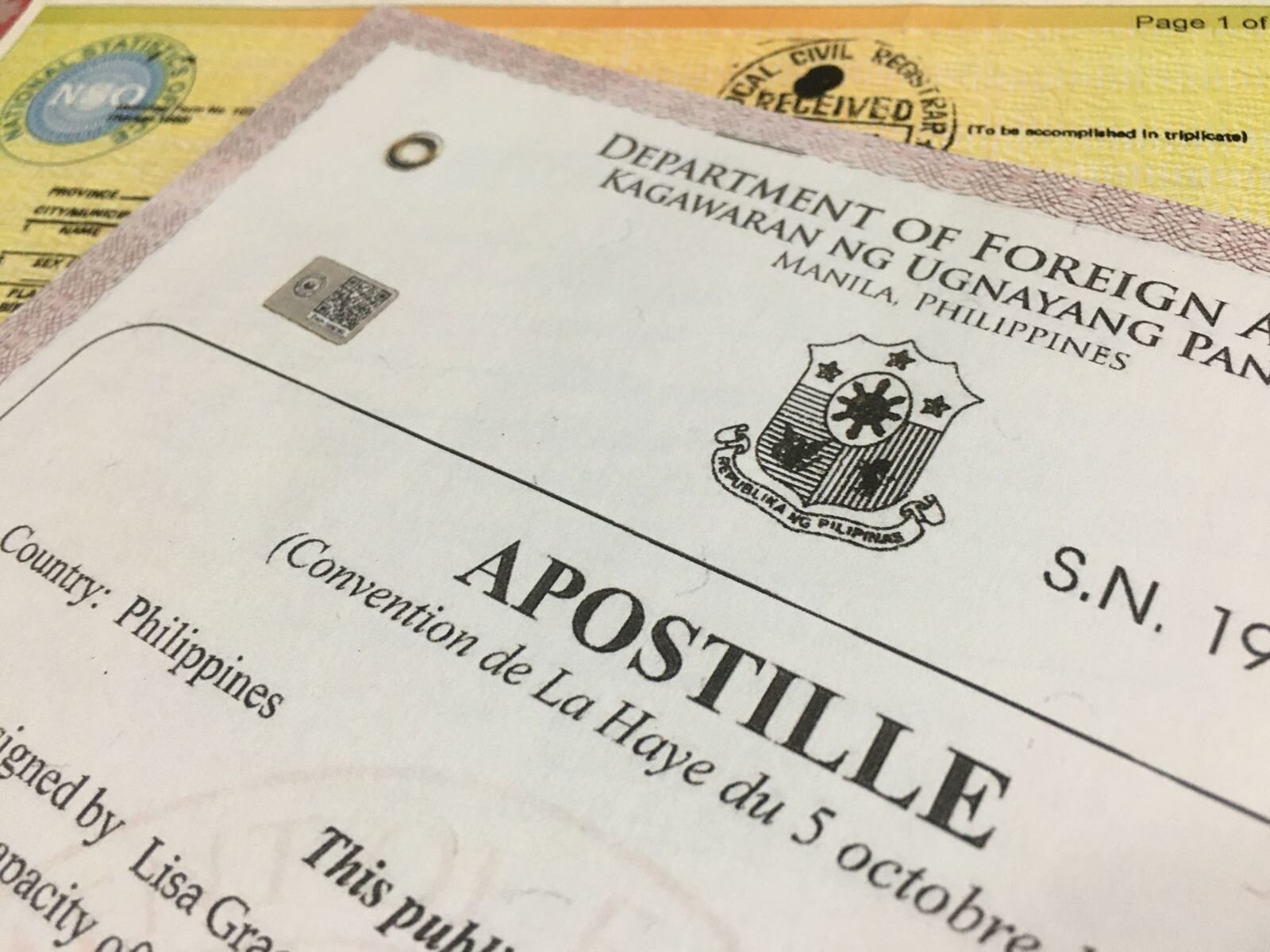
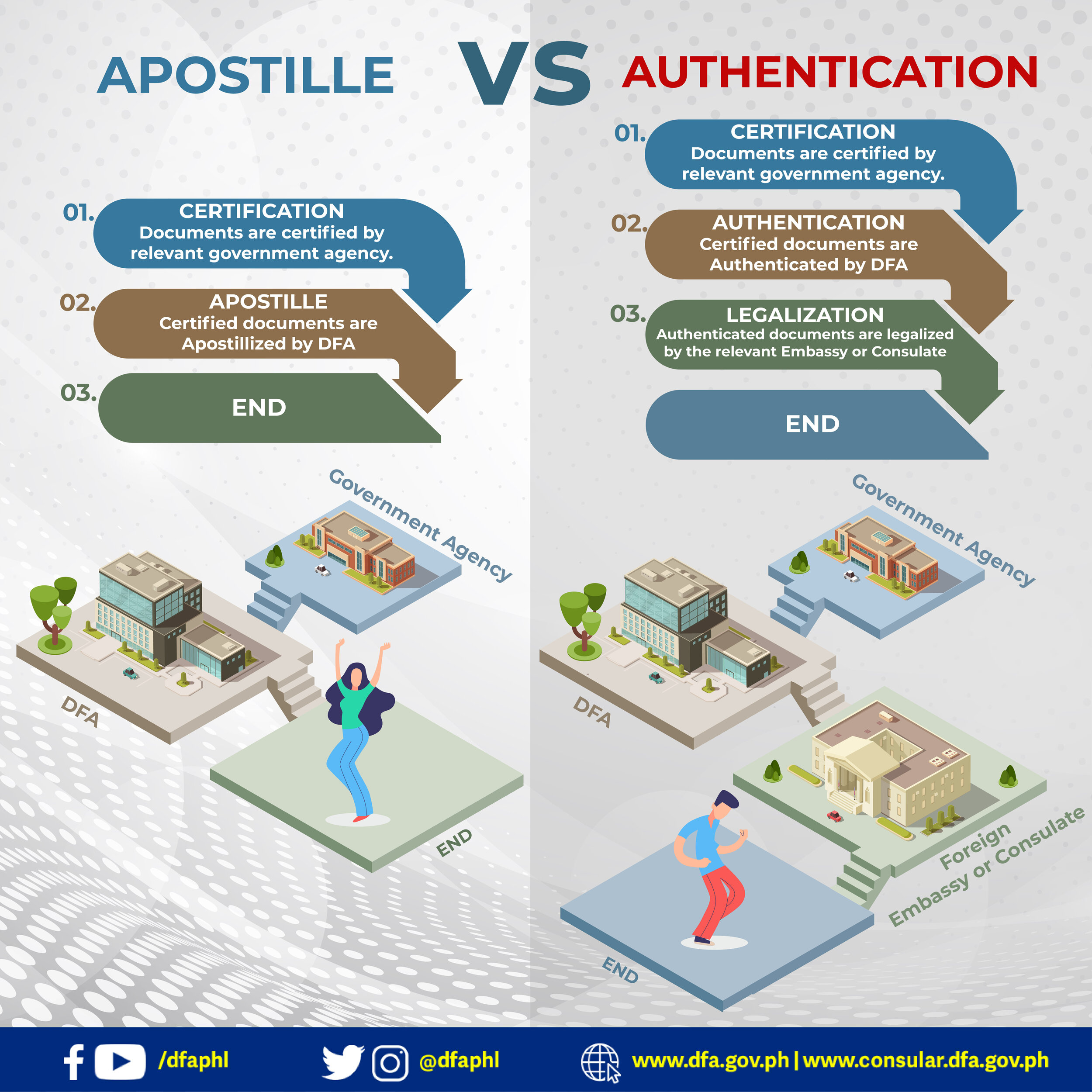




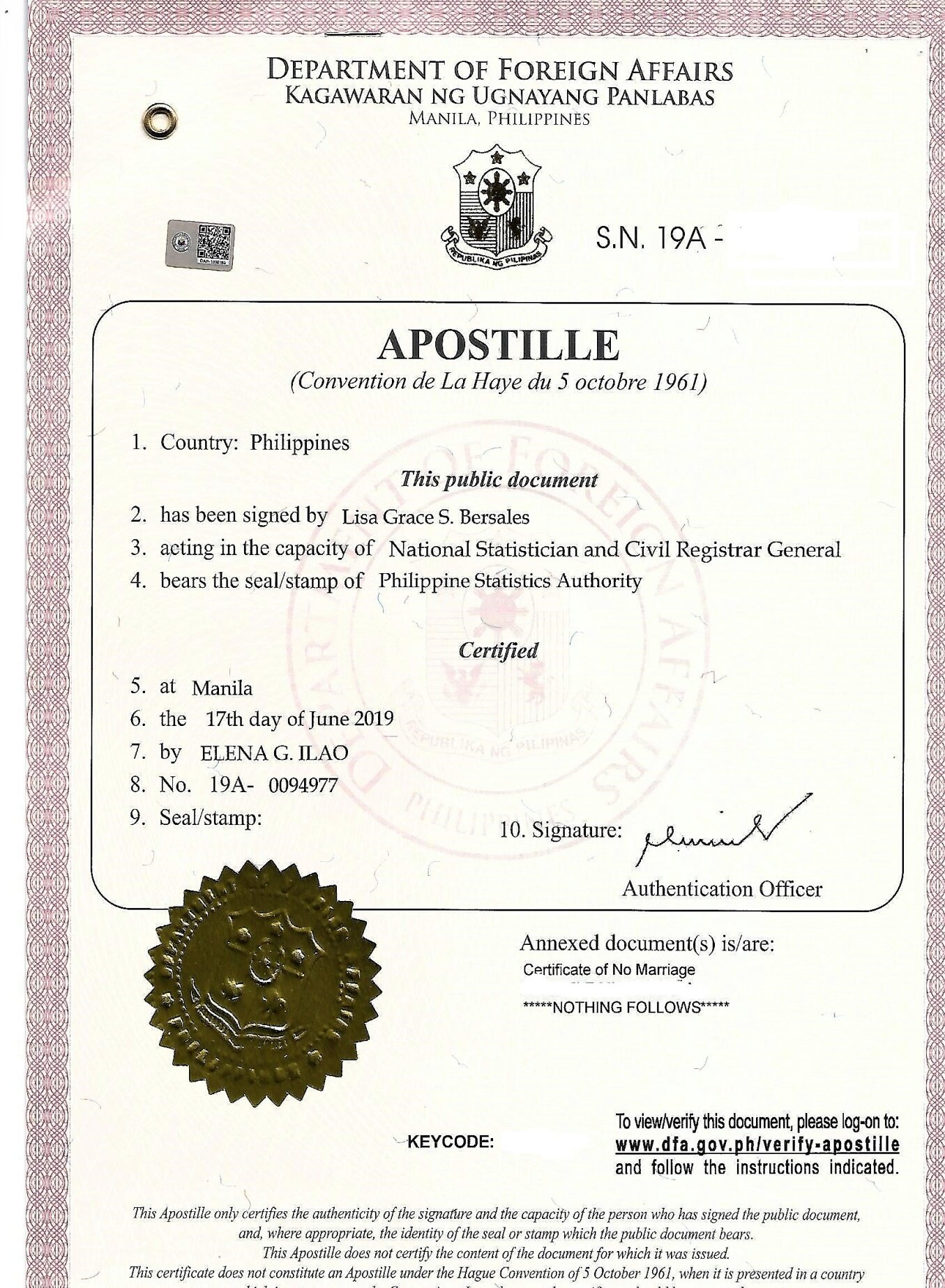

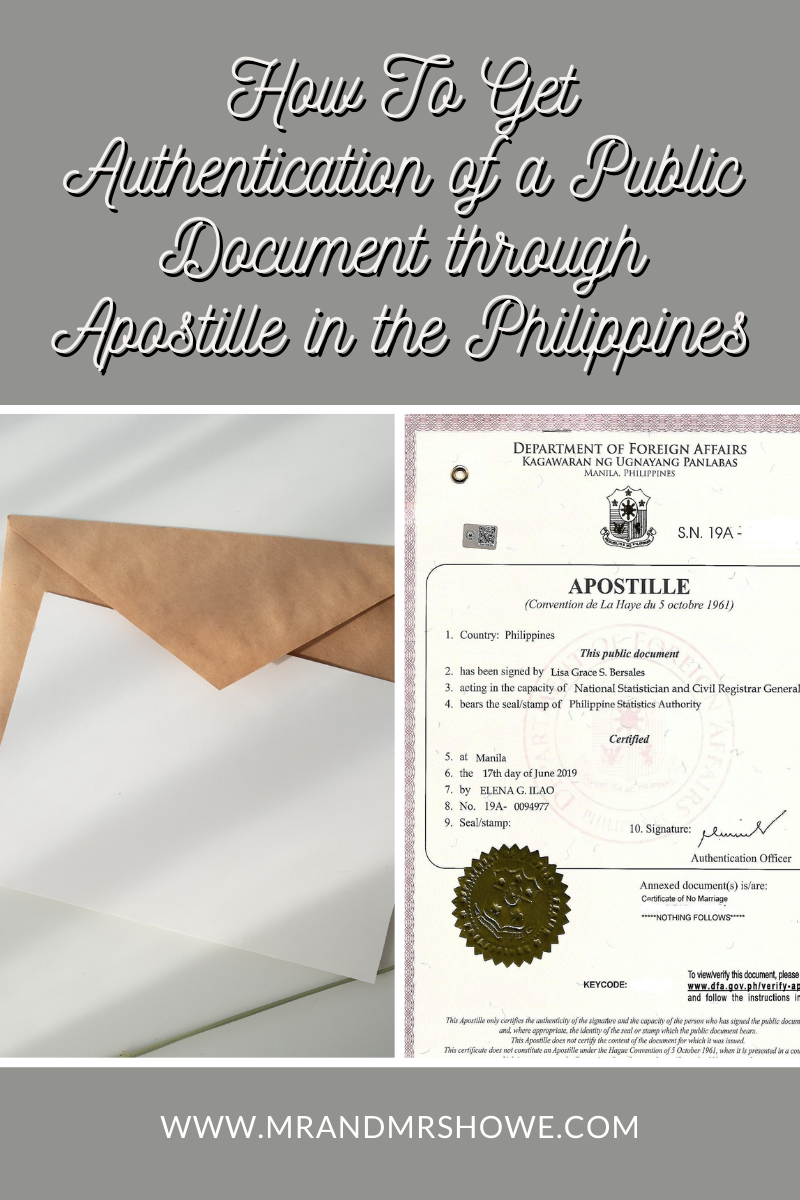
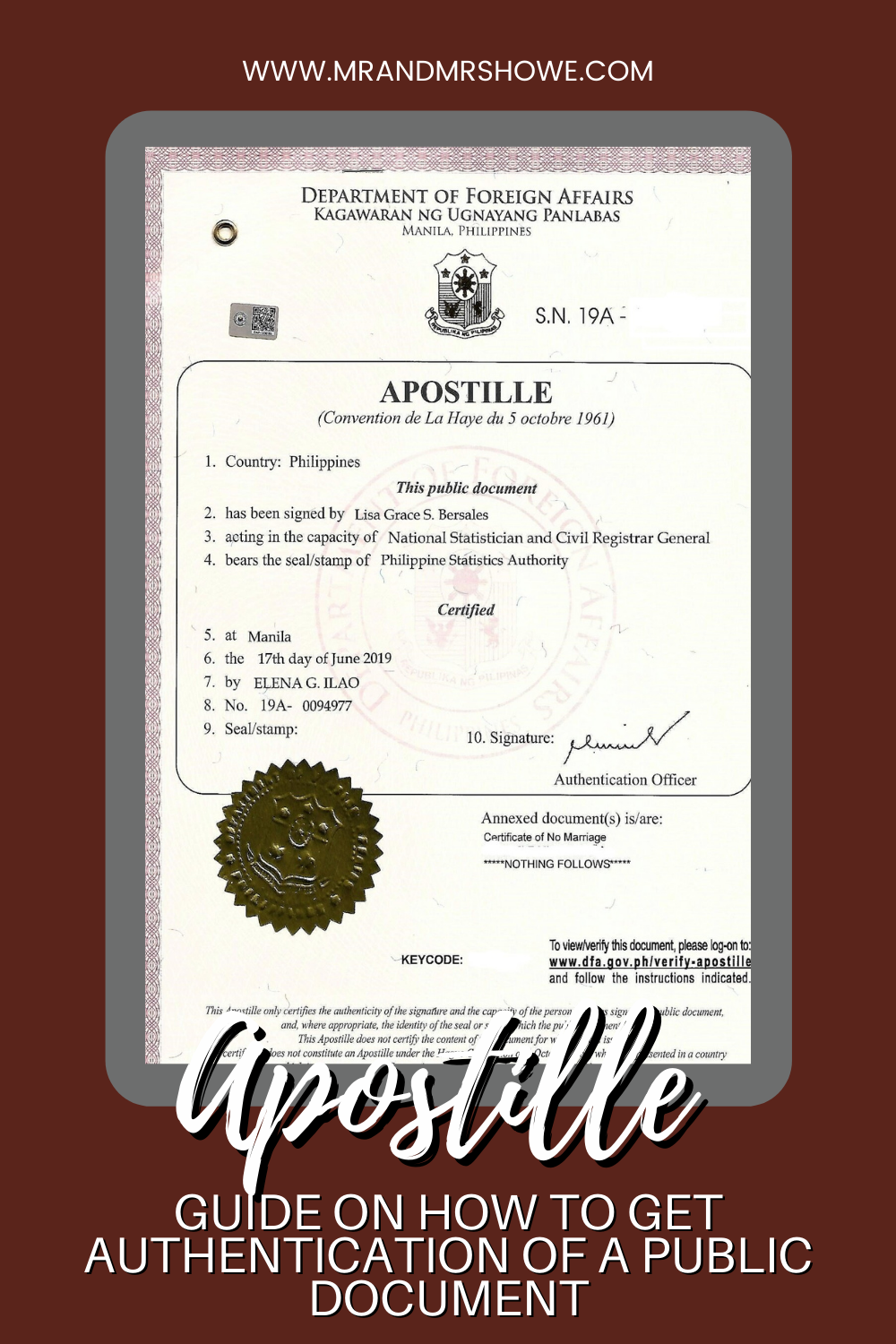
![Is Indonesia Visa Free for Filipinos? [Visa Free Guide To Indonesia For Philippines Passport]](https://images.squarespace-cdn.com/content/v1/5806a87f6a4963c2ddce112c/1620877824243-ZMBGBGM5YVI62RI034BT/unsplash-image-QUwLZNchflk.jpg)

![Fake Flight Ticket Generator and Fake Airlines Ticket: Why you should not use it? [And the Solution!]](https://images.squarespace-cdn.com/content/v1/5806a87f6a4963c2ddce112c/1584513109131-GN1CS1JIEB9V9QDNICFY/image-asset.jpeg)
![How to Extend Your Stay While in America on a Tourist Visa [USA Tourist Visa Extension Request]](https://images.squarespace-cdn.com/content/v1/5806a87f6a4963c2ddce112c/1629872924020-5KAHM8N0UINT21MNI08K/How+to+Extend+Your+USA+Tourist+Visa+While+in+America.jpg)

![Is Colombia Visa Free for Filipinos? [Visa Free Guide To Colombia For Philippines Passport]](https://images.squarespace-cdn.com/content/v1/5806a87f6a4963c2ddce112c/1621524991651-QSFBDR3MPUHAYGTBAPXR/unsplash-image-P3PFi8THbUs.jpg)
![Is Thailand Visa Free for Filipinos? [Visa Free Guide To Thailand For Philippines Passport]](https://images.squarespace-cdn.com/content/v1/5806a87f6a4963c2ddce112c/1620903297569-SSNAQF2HRML4NQQTSA39/unsplash-image--1h_NN3nqzI.jpg)
![How to Apply For Angola Tourist Visa with Philippines Passport [Angola Tourist Visa for Filipinos]](https://images.squarespace-cdn.com/content/v1/5806a87f6a4963c2ddce112c/1621612108143-YGB17KV2CKVZKURWE8M2/unsplash-image-Tri_u7qeqGw.jpg)